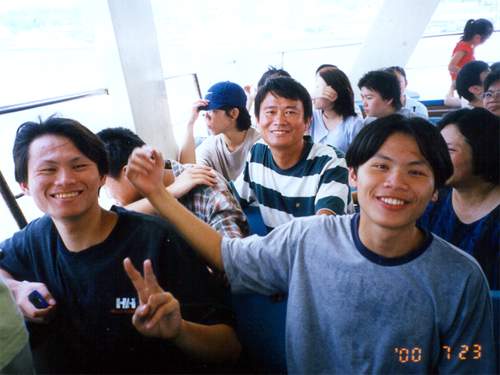
|
| Personal background |
|---|
I'm the boy on the right in gray T-shirt.
I'm a freshman in an university in Taiwan,majoring in computer science.
By now,I'm eighteen years old.
I found swimming is graceful,and help people gain healthy.
And I enjoy it very much.(Though I cannot do it very well.)
When I am alone,I often wonder that if there is any extraterrestrial intelligence.So I would go out ,gazing at the starry night.
Maybe,somewhere above our sky,there is someone searching for us also.
If it's true,it will be very interesting that we search for each other
just like a boy and a girl searching for each other with radio telescope. |
| Thoughts about SETI and SETI@home |
|---|
I think extraterrestrial life does exist!
If not,it's waste of space.
Maybe we can discover it by the end of the 21st century.
If we find each other,we can exchage our experience and technology.
If they were hostile,we may suffer from serious danger such as
alien army invading our earth just like so many Hollywood commercial films.
But we may find a way living together peaceful.
I think it would be all right if we transmit a beacon for others to find.
It might be helpful for others to find us.
On the contray,the universe is so huge that even if the signal travels in
light speed, we cannot get response right away.
If we need to send something, we might send something about cultrues around
the world.
I run SETI@home because I cannot sponsor the project.
So I run SETI@home to support the project.
If there is extraterrestrail life up there,
it will cause an impact on people's view toward there living environment.
Maybe,people will be more appreciative to our earth that we live on. |
| Your feedback on this profile |
|---|
| Recommend this profile for User of the Day: |
I like this profile |
| Alert administrators to an offensive profile: |
I do not like this profile |
|
|

